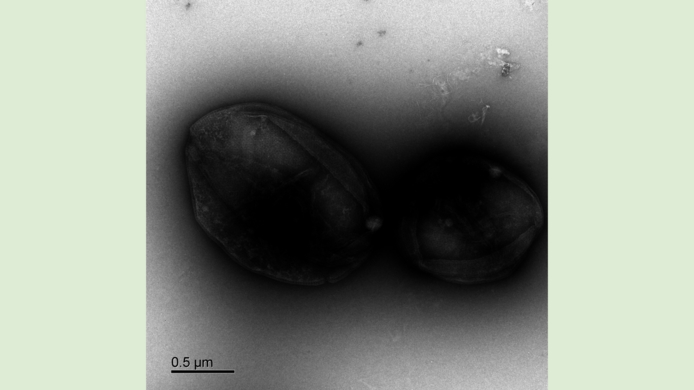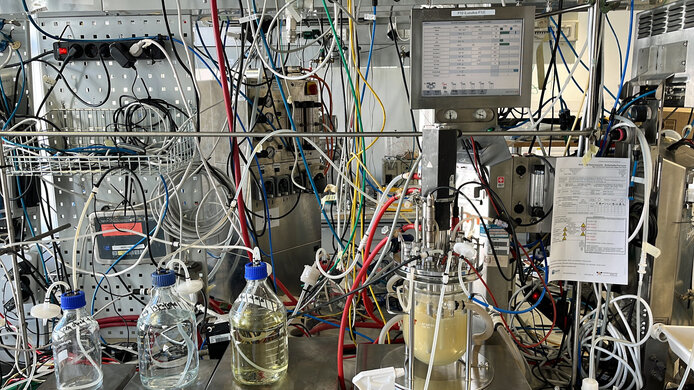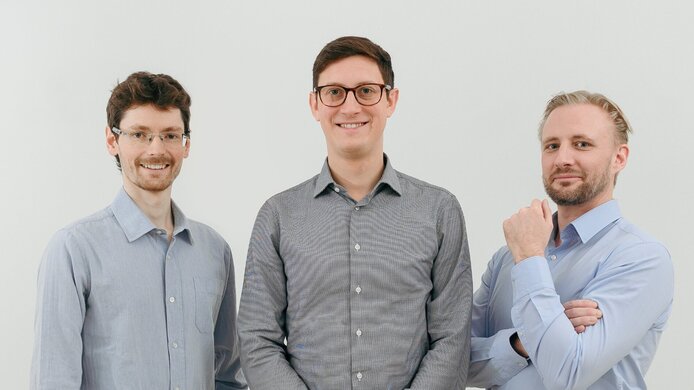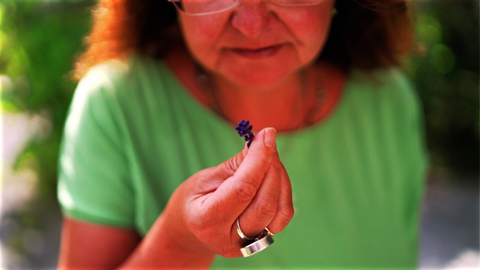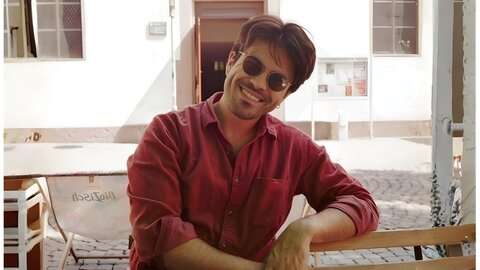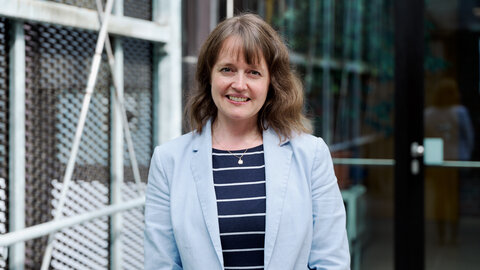Research and application go hand in hand
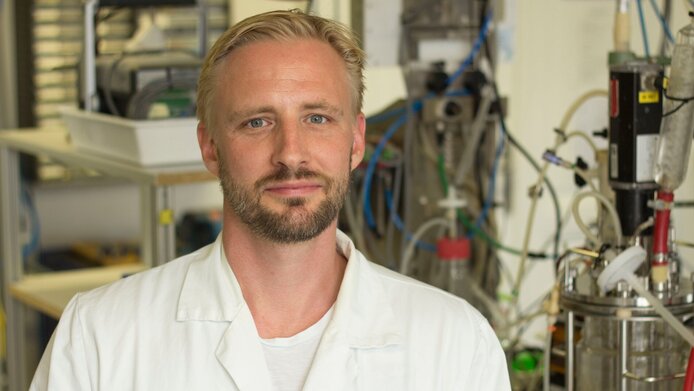
Austria Wirtschaftsservice, the promotional bank of the Austrian federal government, recognizes companies that have turned research findings into profitable innovations through its annual PHÖNIX founders’ award. Earlier this year, the biotechnology company NovoArc won the award in the start-up category. “We feel extremely honored and grateful for the media attention our work has received,” a happy Oliver Spadiut says about winning the prize. Spadiut, a biochemical engineer, founded NovoArc together with his colleagues David Wurm and Julian Quehenberger as a spin-off of the Technical University of Vienna (TU Wien) in 2021. The company produces and sells unique stabilizing lipids that keep active pharmaceutical ingredients intact as they pass the stomach, helping the body absorb them more effectively.
Better drug absorption
Many active ingredients are either poorly absorbed by the human body or not at all, which is why they must be administered to patients through injections – much to the chagrin of people who are afraid of needles. Through many years of research, the bioengineers were able to solve the problem of how to administer drugs in a way that helps the body absorb the active agents. Upon discovering particularly robust lipids in microorganisms, they further developed a technology through which these lipids protect the medicine from gastric juices ten to 15 times more effectively than conventional lipids.
Start-up prize for NovoArc
The young biotech company NovoArc has been awarded the Austrian Phoenix start-up prize for innovative drug delivery technologies. Their method could replace syringes with tablets, absorb active ingredients in the body more efficiently and significantly simplify the transportation of medication.
The makings of a survival artist ...
The lipids in question are derived from a special microorganism that thrives in harsh conditions. Sulfolobus acidocaldarius is an archaeon found in the vicinity of volcanoes, more specifically, in sulfur springs with temperatures of about 90°C and a pH value between 1 and 5. Through many years of intensive work, the TU Wien researchers discovered the reason why these microorganisms do so well in taxing conditions: they are equipped with special lipids that stabilize their cell membranes.
... that protects active ingredients and ...
These lipids are perfectly suited to protect active ingredients against degradation. Many orally administered substances are broken down by acid and enzymes in the human stomach, passing the intestines without being properly absorbed into the bloodstream. Thanks to the lipids developed by NovoArc, active agents pass the stomach unharmed and are absorbed in the intestines.
... facilitates the storage and transport of drugs
And there’s another benefit: as the lipids provide for a high level of stability, active ingredients can be stored more easily. Some drugs and vaccines must be maintained at temperatures of up to 70°C below zero. “Through our technology, pharmaceutical products – among those also mRNA vaccines – can be stored at room temperature, which makes costly cold chain management redundant and thus facilitates medical care for patients in remote areas of the world,” Spadiut explains.
No more needles
Furthermore, the lipids increase the agent’s bioavailability in the human body by five to ten times, whether they are administered as a pill or via injection. Adding these lipids to an mRNA vaccine results in a four-fold boost of the substance’s bioavailability, which means that four people can be vaccinated with the same dosage instead of just one. “We are working on an mRNA vaccine that can be administered as a pill to make injections redundant,” Spadiut outlines NovoArc’s next goal.
From wood to protective shells for active ingredients
Spadiut first encountered this specific archaeon in his work for an EU project on upcycling wood pulp. The aim was to identify an organism that would turn the sugar in lignocellulose – the structural material in the cell walls of all woody plants – into a higher-order product. “When we searched the literature for organisms that might have the desired properties, we came across Sulfolobus acidocaldarius. At first, we were astonished that this organism could survive in such extreme conditions. And that’s how we discovered the stable lipids,” Spadiut says about his journey of discovery from wood to protective shells for active ingredients.
Collaborating with research groups from Germany, he was able to turn xylose (“wood sugar”) into xylitol (“birch sugar”, a common sugar substitute). A targeted use of drugs in increasingly personalized medicine: that’s the shared denominator of the four FWF-funded basic research projects led by Oliver Spadiut.
Horseradish enzymes for cancer treatment
His first two projects focused on an enzyme that is predominantly used in diagnostics and targeted therapies for cancer. Both chemotherapy and radiation therapy take a heavy toll on the human body, prompting researchers to look for more targeted ways to attack cancer cells and simultaneously minimize side-effects for patients. As an enzyme therapy would damage healthy tissue to a lesser degree than the above-mentioned treatments, the quality of life of cancer patients could be significantly improved. An enzyme called horseradish peroxidase (HRP), found in the roots of horseradish, has turned out to be an effective means in targeted cancer treatments.
“It used to be quite difficult and unsustainable to isolate the enzyme from horseradish,” Spadiut says. Together with his colleagues, the researcher was able to develop a method through which the enzyme can be reliably mass-produced through biotechnological processes. TU Wien has successfully protected these findings in two patents, and respective licenses have already been granted to manufacturers.
Natural killer cells
Currently, Spadiut is investigating so-called natural killer (NK) cells at TU Wien as part of a project funded by the FWF. NK cells are important components of the human immune system. “Ten percent of our white blood cells are natural killer cells. Among the different cell types of our immune system, they stand out because of their ability to eradicate malignant cells in a very targeted way,” Spadiut says, explaining why this research will have such a great impact.
Producing killer cells better and faster
In the past, producing these cells required a cumbersome process. In order to treat a patient with NK cells, they first have to be extracted from the patient’s own blood. The cells are then cultivated and made to multiply outside the patient’s body, only to be finally re-injected to fight the disease. In order to cultivate these cells and make sure that they can be safely and effectively used for treatment, their natural environment, i.e., the human body, must be simulated. But cell properties differ from patient to patient. As a result, all parameters of the cultivation process must be adapted to the ideal state with regard to the patient’s NK cells.
In the long run, the researchers hope to identify and understand the ideal parameters for cultivating NK cells in order to be able to produce sufficient amounts to treat patients faster while simultaneously maintaining the cell’s high toxicity levels. The project, which is almost at the finishing line, has been “very successful,” Spadiut says with a big smile. Several publications and two patents have already sprung from the project. At the moment, Spadiut is working on an application for follow-up research to further add to the scientific knowledge in this domain.
Decoupling economic growth from resource consumption
Oliver Spadiut is not only a professor at TU Wien, he is also a key researcher in the FWF’s “Circular Bioengineering” Cluster of Excellence, which was kicked off in late 2024. In this cluster, an interdisciplinary team based in five research locations across Austria is looking for ways to achieve economic growth that is not tied to an increased use of resources. The use of our limited resources to produce consumer goods creates wealth in the short term, but in the long run, it will put the livelihood of many species at risk. The researchers are looking for renewable resources and ways to use them efficiently and in a circular way to help us move away from materials based on fossil fuels and towards organic alternatives.
An eye on application
While Spadiut’s focus is on basic research, he never loses sight of the practical application of his findings. Although his primary goal is to understand processes, he is also eager to share his knowledge to make them reproducible, controllable and fit for mass production, so that different products can be introduced to the market in a quick and safe way. “Sustainability and process intensification against the backdrop of pandemics and the rising number of armed conflicts around the world, that’s what motivates me in my work,” he says.
His student roster reflects the increasingly important role of digitalization in process analysis. “Today, a quarter of my PhD students are data scientists working on digitalizing processes and helping us avoid fail batches,” he explains.
Choosing life sciences over med school
Born in the Styrian Murtal valley to a family of veterinarians, Oliver Spadiut always dreamed of becoming a pediatrician. After completing the mandatory military service, he had a few months to explore Vienna’s university landscape before enrolment began – and ended up choosing the University of Natural Resources and Life Sciences, Vienna (BOKU) over the Medical University of Vienna. In addition to medicine, he had always had a strong interest in biotechnology. “I had the choice of studying medicine with 500 other students or studying in a cohort of 120 students at BOKU. It was a rational decision for me,” he says.
Linking basic research to applications
His choice of university, however, did not change his original wish to work with people and advance pharmaceutical research. Today, he describes teaching, one of his obligations in his role as a university professor, as “one of my favorite things.” And he greatly appreciates the opportunity to connect basic research with real-life applications. Pharmaceutical companies are among his major research partners. “I understand where they come from and respond to their needs by bringing basic research and process development together. That’s what I love about my job: the fact that research and application go hand in hand.”
As a doctoral student, Spadiut was a visiting scientist at the University of British Columbia (UBC) in Canada, and he also spent two years as a post-doctoral researcher at the KTH Royal Institute of Technology in Stockholm. He believes the years he spent in Sweden were formative for his academic development. “My advisor taught me how to write papers and applications for grants,” he recalls.
An academic path full of hardships
After his return to Vienna 15 years ago, he went through a challenging phase characterized by many uncertainties. “I took every step on the academic career ladder: from university assistant to full professor,” he recounts. During this time, fixed-term contracts and the fact that the number of years researchers can get postdoc contracts is limited to six (due to the so-called consecutive-contract regulation) were particularly troubling. “I had two small children and didn’t know whether my contract would be renewed only weeks before it ended,” he recalls about those nerve-wrecking years. He says that you have to be lucky enough to be in the right place at the right time and also have something to show for yourself when this time comes. “Without a track record of third-party-funded projects and published papers, I would not be where I am today.”
Consecutive-contract regulation as a serious stumbling block
Spadiut has seen some colleagues exit research – sometimes involuntarily as they had already secured third-party funds. What made them leave was Austria’s consecutive-contract regulation. While companies are legally obliged to permanently employ staff who were hired with fixed-term contracts after a given number of years, universities are allowed to hire them through consecutive contracts. The same law that allows for this, however, puts a hard stop to it after eight years, when a person must get a permanent contract or leave their university for good.
Ninety percent of researchers on fixed-term contracts
Most often, the second scenario plays out, as a recent study on precarious employment conditions at Austrian universities has revealed: researchers then go abroad or join companies, students face lecturers who have too little time for them, and research suffers from a lack of continuity as fixed-term contracts keep forcing staff out Netzwerk Unterbau Wissenschaft, an initiative seeking to improve the working conditions of employees at Austrian universities, points out that 90% of researchers and lecturers below the professorship rank, which accounts for 34,000 scientists and researchers in all of Austria, have temporary contracts.
The lack of secure employment also affects people’s personal lives, for instance when they try to get a loan or an apartment. It is important to note that this concerns university staff who are no longer young adults: more than half of the study participants were between 30 and 44 years old. This is a time when many people wish to start a family. “And women are disproportionately affected by this,” Spadiut says.
A call for transparency
Spadiut also sees a lack of transparency when it comes to the current career model at Austrian universities. “There should be – provided qualification agreements are satisfied – clear and transparent career paths. Time and again I found myself in situations with so many question marks.”
“Austrian funding landscape really quite good”
What motivated him to stay in research despite everything? “The mix of research and teaching and the freedom to work on things that I am really interested in as long as I can get the funding,” he says. “Is there any other job in the world which offers all of that? I don’t think so!” Being granted a Christian Doppler laboratory in 2023 was a special milestone in his career. “The Austrian funding landscape is really quite good,” he says. “If you have a good idea and do your homework properly, you will get the money. Depending on your field, you will be able to finance your work through grants for a while,” Spadiut says with confidence.
Developing new things and crunching figures
His advice for colleagues considering founding a start-up is to develop something that’s really new and take calculations very seriously. “What is the state of the art? What is new about my contribution, and could I get a patent for it? Is there a need, a market for it? You have to assess the competition on a global level.” Founders should figure out production costs early on and find out whether there is a market for their product. “If you see that there are already a hundred companies offering what you have in mind, don’t get in line to be number one hundred and one. In that case, it’s better to leave it be and not have to close shop after only two or three years,” he points out. The industry he is active in is particularly expensive, requiring instruments such as bioreactors.
Making use of consulting offers
His advice for young colleagues is to take courses on cost calculation. There are numerous workshops that offer helpful input. He points to the i2c Innovation Incubation Center at TU Wien, Vienna’s high-tech incubator INiTS and the Austrian Research Promotion Agency (FFG) as examples. “In the beginning, everything was exciting and we were on a founder’s high, but then we made sure to do the math right away and figured out where we had to get to have a product that sells,” he remembers about the early days of his company. Today, NovoArc counts 17 employees and business is going strong.
About the researcher
Oliver Spadiut (45) holds a chair at the Institute of Process Engineering, Environmental Engineering and Technical Biosciences at the Technical University of Vienna (TU Wien). He studied biotechnology at the University of Natural Resources and Life Sciences, Vienna (BOKU), was a visiting scientist at the University of British Columbia (UBC) in Canada, and a postdoc at the KTH Royal Institute of Technology in Stockholm. In 2015, he completed his habilitation in biotechnology at TU Wien and established his own Integrated Bioprocess Development research group.
In 2021, he founded NovoArc together with his colleagues David Wurm and Julian Quehenberger as a spin-off of TU Wien. The company produces and sells stabilizing lipids that help active pharmaceutical ingredients stay intact as they pass the stomach, as a result of which the body can absorb them more effectively. In 2022, he was appointed head of the Biochemical Engineering research area.
